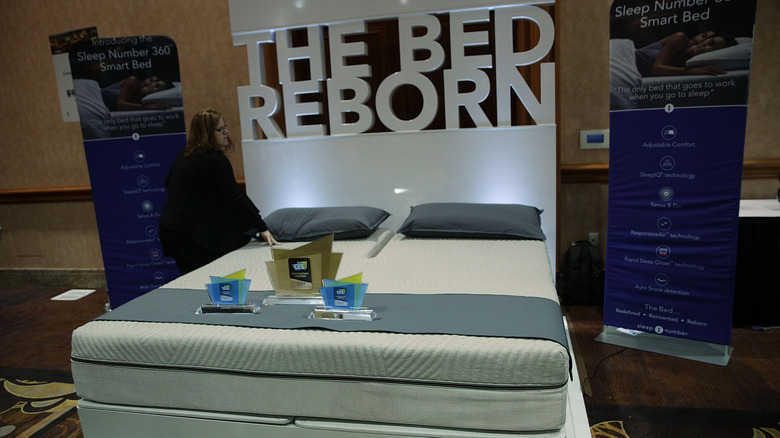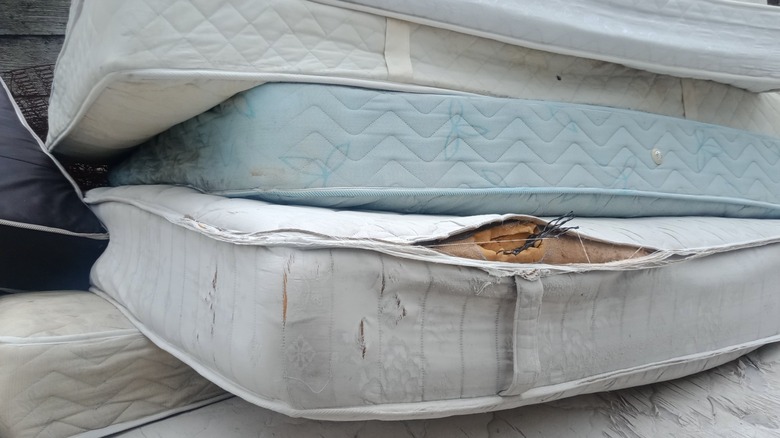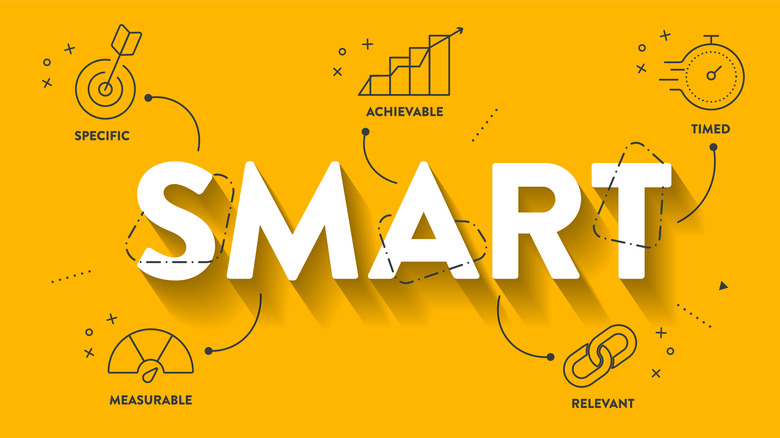What Does A Smart Mattress Do? What To Know About The Latest Bed Tech Before You Buy
"Smart" is the go-to word for tech marketing departments around the globe. From phones to cars, TVs, watches, pet feeders, hairbrushes, and forks that promise to help you lose weight, there's seemingly no end to what can be turned into a device with some level of intelligence.
The prevailing theory is that if you pack something with the latest and greatest technology and connect it to the Internet, it's just got to be smart. But do we want sensor-laden beds to track our every non-waking move? Too late. The iBed is already here. Ford made a bed that rolls sleepers back to their side of the mattress when they inadvertently cross an invisible territorial boundary.
Smart beds incorporate a host of tech to enhance our overall sleep experience. They do this by analyzing sleep pattern data collected during each night's slumber. In theory, it's a great idea, especially when we spend upwards of a third of our lifetime in bed (sleeping, tossing, turning, etc.).
Not your daddy's sack of hay
The U.K. bed retailer Dreams says the average person spends around 33 years total in bed. Breaking it down more, we only spend 26 of those years sleeping, while the other seven are spent there lazily or trying to drift off into the Sandman's realm.
Maybe having a bed that automatically senses when you need it to be firmer, changes the temperature to make your slumber cozier, or adjusts the level of the head or feet wouldn't be so bad. But as the price of a good education is steep, so is a bed imbued with intelligence. According to Sleep Foundation, the average foam or innerspring "dumb" queen-sized bed lands somewhere between $700 and $1,200, while snatching up a "well-made model with durable materials" will set you back much more.
An internet search for a simple queen with memory foam from an established retailer costs $450. That same-sized bed equipped with the brain cells from a purveyor of iBeds will set you back $1,100. And that's before you add the integrated base and frame, which you need to take that bunk from high school valedictorian smart to Albert Einstein smart.
The price for larger, more feature-rich bunks (like air pockets instead of coils) jumps exponentially and can cost as much as a certified, well-equipped, pre-owned car.
Is your bed's IQ higher than yours?
So what are you getting for all that money? The intelligence of each bed boils down to how much technology is inserted into the mattresses themselves. Rajasi Mills, VP of SleepIQ Health and Research at Sleep Number, said the wave of smart beds began as a quest to adjust a mattress' firmness automatically.
Today's high-end beds have what are called ballistocardiogram sensors working to collect data about how you sleep. The tiny computer deep inside then analyzes all that data from the sensors and processes it in real-time to constantly adjust the bed. For instance, one feature can detect when a person starts snoring and automatically raises the head of the bed to make that person stop sounding like a one-person heavy metal concert.
Everything from a person's heartbeat and breathing rate to how often the body moves around (your restlessness) can be tracked. Sleep occurs in four stages, including three non-REM (NREM) stages (NREM 1-3) followed by the rapid eye movement (REM) cycle, when most dreams occur and where we spend 25% of our time sleeping.
Each cycle usually lasts anywhere from 1.5 to two hours. If you're lucky enough to get eight full hours of sleep, you're probably averaging four to five cycles a night.
Sleep never felt so good
Other things like active air technology monitor how hot or cold your body gets and then raise or lower the temperature by as much as thirteen degrees based on your parameters. Audio features can connect to a home stereo and play the soothing sound of ocean waves or your favorite meditation program to help ease your body and mind toward sleep.
All of the data is sent to sleep-tracking apps which can then be viewed and used not only to help get a better night's sleep but even ferret out possible sleep disorders and maybe even predict future problems including issues like sleep apnea. In a country where one in three adults don't get enough sleep, this is excellent news.
Picking the right bed — dumb or smart — can be difficult because there are so many options. All the bells and whistles can be overwhelming, especially when you factor in how much cold, hard cash it will take to get that perfect night's sleep. Considering how much time we spend in bed, and the good it can provide, snuggling up to that artificial intelligence spying on us at night might be worth it.



